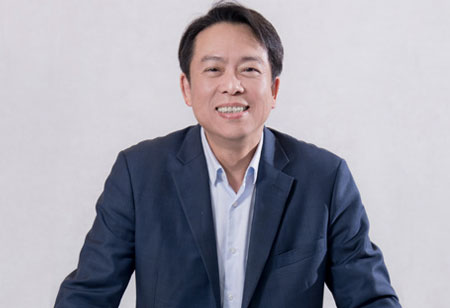
Peter Wu: Shaping Taiwan's Technological Future Through Ai And Digital Transformation

 Taiwan, a global center of technological innovation, has become a leader in digital transformation and artificial intelligence (AI). This development has been greatly aided by visionaries such as Peter Wu, the CEO of ASUS Cloud & TASC. A trailblazing figure in Taiwan's high-tech sector, Peter Wu has crafted an impressive career that encompasses digital transformation, AI innovation, and entrepreneurship. During his doctoral studies, Peter, a graduate of the esteemed Electrical Engineering department at National Taiwan University, founded his first startup, which was later acquired by Asus, marking the first phase of his journey. At Asus, he spearheaded cloud business initiatives and led the company’s digital transformation.
Taiwan, a global center of technological innovation, has become a leader in digital transformation and artificial intelligence (AI). This development has been greatly aided by visionaries such as Peter Wu, the CEO of ASUS Cloud & TASC. A trailblazing figure in Taiwan's high-tech sector, Peter Wu has crafted an impressive career that encompasses digital transformation, AI innovation, and entrepreneurship. During his doctoral studies, Peter, a graduate of the esteemed Electrical Engineering department at National Taiwan University, founded his first startup, which was later acquired by Asus, marking the first phase of his journey. At Asus, he spearheaded cloud business initiatives and led the company’s digital transformation.
Peter took on a crucial role in 2018, managing the biggest AI supercomputer project in Taiwan, setting up Taiwan AI Service Corporation to advance AI, and managing 500 professionals. Currently, in the third stage of his career, Peter is using AI to influence Taiwan's future by fusing technological prowess with social responsibilities.
Embarking in an engaging interaction with CEO Insights Asia magazine, Peter shares his strategies, future roadmap, and much more. Let’s delve into it.
What are the valuable lesson or experience that you gained from your time at National Taiwan University?
I found that the atmosphere at National Taiwan University was very welcoming and encouraging, which inspired me to explore, learn, and make connections with a variety of people.
Beyond Taiwan, this openness offered chances to establish networks and friendships in the US and Japan. It inspired me to understand the world and my place in it, and it also helped me gain a wider perspective and a strong sense of leadership in addition to helping me advance professionally.
How have your academic and extracurricular skills contributed to your current role?
My extracurricular and academic experiences at National Taiwan University helped me develop the skills I need to succeed in my current position. The Electrical Engineering department encouraged us to delve deeper than our immediate interests by providing a wide and varied curriculum in the classroom. I was able to expand my knowledge and abilities by enrolling in a variety of professional courses and even studying in different departments due to this openness. Our professors constantly inspired us to think beyond the technical and adopt a global perspective to understand the world driven by electricity and digital advancements.
The university promoted involvement in a variety of extracurricular activities in addition to academic pursuits, which helped me develop my leadership, collaboration, and problem-solving skills. I learned how to approach problems holistically from these experiences, fusing technical know-how with a greater comprehension of diverse perspectives. This combination of extracurricular development and academic rigor has been extremely helpful in my current position, giving me the flexibility and foresight I need to be successful.
My vision is to shape a lasting legacy in Taiwan's ICT ecosystem by pioneering innovation and accelerating the advancement of AI technologies
How accessible were the faculty to the students during your time at the institute?
Even as undergraduates, students found it easy to approach the faculty at National Taiwan University with questions or to participate in their projects because they were so approachable and kind. Their transparency made it possible for me to participate in experiential learning, learn beyond the classroom, and keep up with emerging trends and technologies, all of which enriched my academic journey.
Which memory from your time at the institute stands out the most?
Leading the student association of Electrical Engineering department during my second year at National Taiwan University stands out as one of my favorite memories. I helped seniors in high school learn about the department and its opportunities by planning the first student camp. I was able to lead, collaborate, and leave a lasting impression due to this initiative.
How do you approach leadership and delegate responsibilities to help your team grow?
As a leader, I encourage my team to think creatively and have faith in their ability to work together to solve problems. I place a strong emphasis on teamwork and maintaining a positive attitude when collaborating with people.
My experience at NTU's Electrical Engineering Department has inspired me to instill a sense of purpose and responsibility in my team, motivating them to make significant contributions to society. I make sure to delegate tasks in a manner that will help everyone gain experience, build confidence, and collaborate to produce efficient results.
What future aspirations do you hope to achieve going forward?
I want to help Taiwan become a leader in AI and spearhead the next stage of our high-tech industry's expansion. I intend to use AI's potential to open doors that will boost Taiwan's competitiveness internationally and encourage the next generation to push the limits of innovation and technology.
Peter Wu, CEO, ASUS Cloud & TASC
Peter Wu holds a Ph.D. in Electrical Engineering from National Taiwan University, where he also completed his Bachelor’s degree in Electrical and Electronics Engineering. He is the CEO of ASUS Cloud Corporation, a role he has held since 2000, and concurrently serves as the Chief Executive Officer at Taiwan AI Service Corporation.
Hobbies: Writing Codes and Programs, Playing Drums, Listening to Music
Favorite Cuisine: Chinese
Favorite Book: Who Said Elephants Can’t Dance?: Inside IBM’s Historic Turnaround by Lou Gerstner

